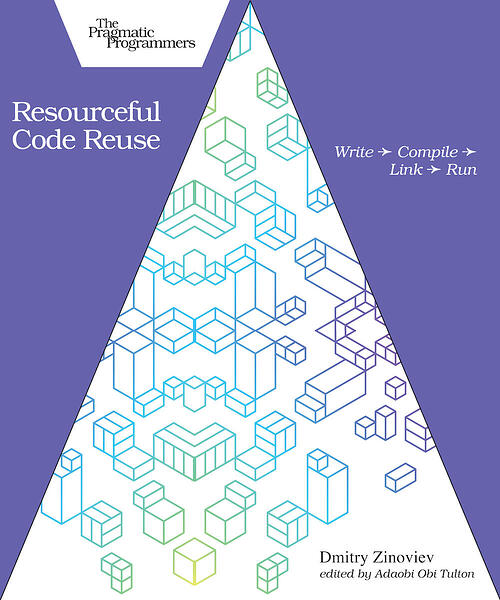Resourceful Code Reuse (Pragmatic Bookshelf)
PragmaticBookshelf
Dmitry Zinoviev @aqsaqal
edited by Adaobi Obi Tulton @aotulton
Get ready to take a deep dive into Python and C while learning to avoid the drawbacks and harness the benefits associated with seven common code reuse models. In no time at all, you’ll develop the confidence to reuse code at any stage of real-world development.
This one-stop solution covers the complete build cycle: editing, compiling, linking, and running a ready program. Apply Linux/macOS power software development tools, such as ld, ldd, ranlib, and nm, to construct and explore state-of-the-art function libraries in C that could be linked with application-specific code either permanently or for the duration of execution. Learn why Python has modules for reuse and how they differ from C object files and libraries. Understand the risks and other negative implications of sharing and reuse. As a bonus, distill the dependencies between your project’s components and automate and optimize your build process with the “make” utility.
Whether you are an amateur coder or an experienced developer, become a more productive and resourceful programmer by reusing previously written code.
Dmitry Zinoviev is a professor of Computer Science at Suffolk University in Boston and has a dual degree in Physics and Computer Science. He is passionate about C and Python programming, complex network analysis, computational social science, and digital humanities.
- Full details: Resourceful Code Reuse: Write → Compile → Link → Run by Dmitry Zinoviev
- View this book’s portal and details on how to post errata and suggestions here
Don’t forget you can get 35% off with your Devtalk discount! Just use the coupon code “devtalk.com" at checkout ![]()
Latest Threads About This Book

Most Active This Week

Most Active This Month

Most Active This Year

Most Active Last Three Years

Most Active Over Three Years

Latest in Resourceful Code Reuse
Get money off!

The Pragmatic Bookshelf
35% off any eBook
Use the coupon code "devtalk.com" to get 35% off any eBook published by PragProg!
Filter by Type:
Related Portals
-
None added yet









